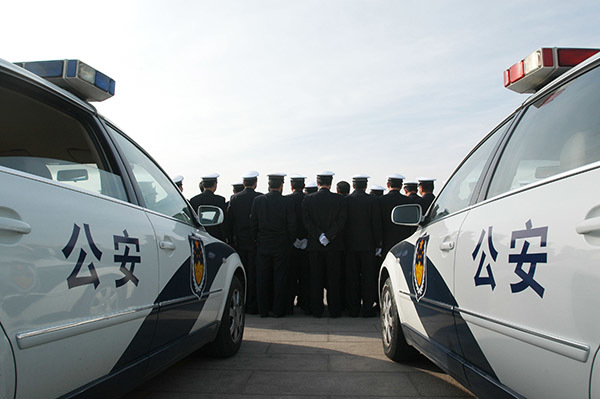March 11, 2023: Senior members of the CCP’s Central Military Commission line up to take the oath at the National People’s Congress. From right to left: Zhang Youxia, He Weidong, Li Shangfu, Liu Zhenli, Miao Hua, Zhang Shengmin. (Lintao Zhang/Getty Images)
[People News] Independent scholar Wu Zuolai published an article on August 15 via Taiwan’s Radio Taiwan International (RTI), analysing the current situation in Zhongnanhai and predicting Xi Jinping’s possible fate. Soon after, he launched his own YouTube channel, Man Shan Man Tan (“Slow Chats with Wu Manshan”). In three parts, he gave a more detailed description of the dim glimmers of secret politics seeping out of Zhongnanhai. The following is his analysis of what he calls: “A coup has already occurred — a silent mutiny is underway.”
Last year, the CCP’s 20th Third Plenum was unusually secretive, with no images of the meetings released, triggering widespread rumours about Xi Jinping’s poor health — even speculation that he had suffered a cerebral stroke.
Wu Manshan observed that after Xi was rumoured to have had a stroke during the Third Plenum, the military essentially took control of military power, including security arrangements for Beijing and Zhongnanhai.
He revealed that Zhongnanhai’s security, information, and surveillance systems were not run by Xi’s own men, but by Zhang Youxia and the General Logistics Department.
“When Zhang Youxia helped Xi Jinping rise to power, all control systems were set up to serve Xi. But once Zhang and Xi split and went their separate ways, the security and surveillance apparatus in Zhongnanhai came under military control. And the military is very adept at taking over,” Wu said.
According to Wu Manshan, after the Third Plenum last year, a series of mutinies — or quasi-coups — did occur and are still unfolding today.
“Neither side has torn the veil yet; nothing is open. But as we look through the dim candle shadows through the windows, we can always hear voices seeping through the walls. Those faint sounds let us glimpse many unusual states of affairs.”
He analysed: If the military had not emerged as an independent force, the dramatic upheavals of the past year would not have been possible. If the Party centre were still as united as a year ago, with Xi Jinping controlling everything, there would not be so many rumours flying around.
Wu pointed out that dissent inside the CCP is not just rumour — it has, in some form, been indirectly confirmed by top U.S. officials.
Last year, Voice of America reported that on August 29, U.S. National Security Advisor Jake Sullivan met in Beijing with Central Military Commission Vice Chairman Zhang Youxia.
“Sullivan looked Zhang straight in the eyes and asked questions. From Zhang’s relaxed, confident demeanour, he could tell that the country’s gun barrels were under this man’s control. Zhang Youxia could decide whether to start a war or not. Even if the Party’s top leader wanted war, Zhang could block it or refuse to cooperate.”
Wu Manshan believes that the U.S. national security team was sharp and accurate in its judgment — they had precisely detected the mutiny taking place in China.
Wu also noticed that since the second half of last year, PLA Daily no longer promoted slogans such as “the CMC Chairman responsibility system” or the sycophantic “Be a good soldier for Chairman Xi.” Instead, articles frequently emphasised “Party principles, collective leadership, and intra-Party democracy.”
“We all know the military is about absolute obedience. How could the army operate by ‘democratic centralism’? Would they discuss and vote layer by layer before a battle or an exercise? Impossible.
So when PLA Daily loudly pushes democratic centralism, it is not for the military itself — it is directed at the Party centre.”
He continued: “It is a call to say: leadership must be collective, not one-man dictatorship. Military affairs cannot be monopolised by one person who promotes whomever he wants, eliminates whomever he wants — eliminating Liu Yazhou, sidelining Liu Yuan, and so on.”
Wu observed that the military’s rise has brought the Party elders back onto the stage. At present, Zhongnanhai is shaped by three power blocs: the Party elders, Xi’s own faction, and the military. These three forces have reached a balance, with none able to crush the others.
“Now the military — specifically Zhang Youxia and Liu Yuan — are no longer aligned with Xi. They oppose his autocracy and dictatorship. They want to complete a power transition quietly.”
On July 31, the CCP Ministry of Defence held a reception at Beijing’s Great Hall of the People for the 98th anniversary of the PLA’s founding. Video footage showed that this year, only about 10 active-duty generals attended, compared to nearly 20 last year. Missing were commanders from multiple branches — Army, Navy, Rocket Force, and Armed Police — including fallen CMC member Miao Hua. CMC Vice Chairman He Weidong was also absent. Most of those missing were officers personally promoted by Xi Jinping.
Three notable retired generals were present: Liu Yuan (son of late PRC president Liu Shaoqi), Wang Guanzhong (CMC General Office chief during Hu Jintao’s era), and Cai Yingting (former Deputy Chief of the General Staff).
Veteran CCP watcher and Nikkei Asia senior writer Katsuji Nakazawa analysed that Defence Minister Dong Jun must have felt the tremendous pressure from military elders at the reception. Their expanded seating at the front round tables signalled an unusually strong presence — a pressure that may affect the trajectory of CCP politics.
Liu Yuan, Wang Guanzhong, and Cai Yingting were seated at one of the large front tables, though not the very centre one. In previous years, they had been relegated to small tables at the back.
(First published by People News]










News magazine bootstrap themes!
I like this themes, fast loading and look profesional
Thank you Carlos!
You're welcome!
Please support me with give positive rating!
Yes Sure!